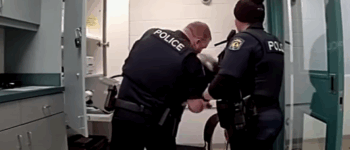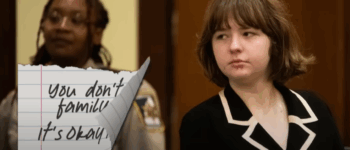It is a case that has left parents, professionals, and communities across the country shaken: the tragic death of 6-year-old Corey Michael, whose final days were marked by pain, exhaustion, and alleged abuse at the hands of his father. What was presented in court this week is not only a story of a boy’s suffering, but also a haunting reflection of how far misguided discipline can go — and when parental authority becomes lethal.

The Disturbing Video Evidence
The prosecution’s most powerful exhibit so far has been the surveillance footage from a local gym in 2021. In it, Corey, small and frail, struggles to keep up on a treadmill. His father, Christopher Gregory, towers above him, demanding that he continue despite repeated falls.
The treadmill runs at a punishing pace, and each time Corey loses his footing, he is thrown back onto the ground. Gregory shows little concern, quickly placing his son back onto the machine, insisting he continue running. At one point, Gregory appears to strike or bite his son on the head — a bizarre and disturbing act that drew audible gasps when the footage was shown in court.
The defense argued that the session was intended as a form of “training” or “discipline.” But to many watching, it was nothing short of torture.
The Days Leading Up to Corey’s Death
The treadmill incident occurred on March 20, 2021. Corey would pass away on April 2, 2021 — just 12 days later.
During that time, according to testimony, Corey lived through a whirlwind of conflicting medical visits and parental disputes. His mother reportedly sought medical evaluations at multiple hospitals, believing her son was being abused. Two doctors confirmed that Corey’s blood was already septic, while another raised concerns about physical injuries. Yet the boy was returned to his father’s custody.
The defense has argued that Corey’s death was the inevitable result of pneumonia and sepsis, not of direct abuse. Gregory himself has stood by this explanation, claiming his son’s death was a tragic illness, not homicide.
But the autopsy report paints a different, darker picture.
Autopsy Findings: Bruises and Blunt Force Trauma
According to the medical examiner, Corey died from blunt force injuries, including trauma to his heart and liver, along with acute inflammation and sepsis. His small body was covered with bruises, many in various stages of healing, suggesting not a single accident, but prolonged, repeated abuse.

The report contradicted Gregory’s pneumonia defense, highlighting instead that Corey’s physical injuries contributed to systemic infection and, ultimately, organ failure.
Expert Opinions: Abuse Disguised as Discipline
The trial featured testimony and expert commentary, sparking heated debate among parents and professionals alike.
- Dr. Christine Belliard, family therapist, told the court:
“Just looking at that video, my answer is yes. That father caused his son’s death. This was way too much for a 6-year-old body to handle. Even if pneumonia played a role, the abuse pushed his body past its limits.” - Lewis Hunter, a father and commentator, presented the opposing view:
“This was not murder. The boy was active in Little League, he even made a flag football team days after the treadmill session. Two doctors said he was septic. The father was strict, yes, but he did not kill his son.” - Jay Bradley, another father, strongly disagreed with Hunter’s perspective:
“I have an eight-year-old. I would never let my son fall repeatedly like that. Even as an adult, you don’t hop onto a treadmill running at full speed. That’s not discipline — that’s cruelty.” - Eva Go, parent and fitness instructor, added:
“In fitness clubs, kids under 12 aren’t even allowed on cardio equipment. Forcing a six-year-old through repeated falls was reckless. By the third fall, it should have stopped. That’s not training, it’s excessive force.”

A Troubled Family History
Beyond the treadmill video, the case has raised questions about Gregory’s past and parenting methods. According to records, he only learned of Corey’s existence when the boy was about three years old. By the time Corey turned four, Gregory had gained full custody after the boy’s mother lost her parental rights.
Neighbors described Gregory as a stern father, heavily involved in youth sports, determined to mold his son into a disciplined athlete. Some saw him as overbearing; others viewed him as a dedicated parent trying to instill toughness.
But critics argue that Gregory was attempting to live out his own unfulfilled athletic dreams through his young son — a pressure that proved deadly.
The Larger Issue: When Discipline Crosses the Line
The Gregory case is not just about one father and one child. It touches on a broader cultural problem: how societies define discipline versus abuse.
In many households, especially in past generations, strict punishment — sometimes physical — was normalized. Parents justified it as “tough love,” believing it built character. But modern research paints a different picture: harsh discipline often causes trauma, not resilience.
As Dr. Belliard noted:
“We live in a culture of violence, where certain forms of abuse are excused as parenting. But it’s not okay. And Corey’s death is a devastating reminder of where this normalization can lead.”
The Trial Continues
As of now, Gregory stands charged with murder. His defense insists pneumonia was the real cause, while prosecutors maintain the father’s abusive behavior directly led to Corey’s death.
The jury will ultimately decide, but one fact is undisputed: a little boy is gone. His life ended not on a football field, not in a classroom, but after days of physical suffering in his own home.
A Call to Reflection
The image of a six-year-old child falling again and again from a treadmill, only to be forced back on, is one that will haunt many for years to come. It forces society to ask:
- At what point does discipline become abuse?
- How much control should a parent have over a child’s body and health?
- And how many more Coreys must there be before the line is drawn?
Corey’s story is more than a tragedy — it is a warning. A warning about unchecked authority, about the dangers of confusing cruelty with care, and about the urgent need to protect children who cannot protect themselves.
His short life ended in pain, but perhaps his death can spark a long-overdue reckoning.


